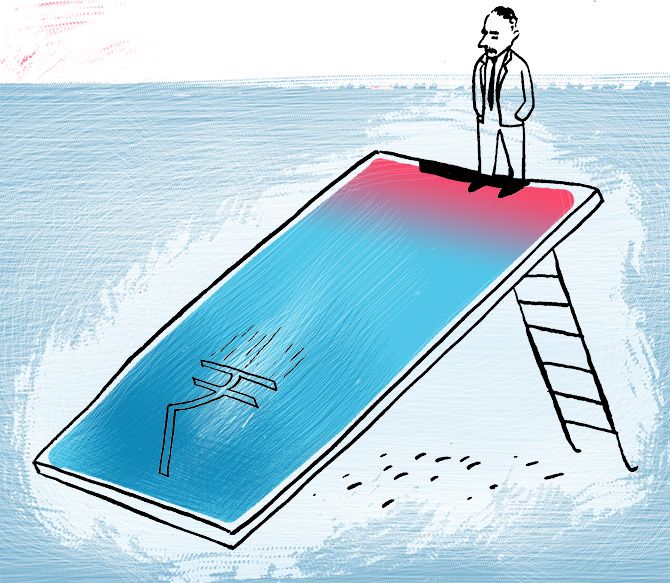The government believes that WTO's push for initiating negotiations on substantive obligations related to e-commerce will oblige India to permanently accept the current moratorium on imposing customs duties on products traded electronically.
Illustration: Dominic Xavier/Rediff.com

India will not join the talks on e-commerce at the World Trade Organization (WTO), with New Delhi pushing the draft e-commerce policy as its response to richer nations, currently batting for global rules for the sector.
Discussions on the rules are set to start by March, but India has chosen not to participate, in protest.
"The idea is to create a set of guidelines that will serve as the basis of any later international agreement on e-commerce, which will favour richer nations owing to the nature of the developed market systems and penetration by online firms in the retail space,” a senior commerce department official said.
The draft, brought out on Saturday, warned about the dangers of massive revenue and data loss, which will accompany any move to build a global e-commerce regime.
It also pushed a crucial demand for data localisation and tech transfer that developed economies have consistently resisted.
“During negotiations, policy space must be retained to seek disclosure of source code for facilitating transfer of technology and development of applications for local needs, as well as for security.
"Policy space to grant preferential treatment of digital products created within India must also be retained,” it said.
On the other hand, the latest developments at WTO are unprecedented, officials said.
“WTO rules come into effect for every one of the 164 members and need to be ratified by each, but for the first time a major decision has been taken without complete consensus among member nations.
"We will not encourage a multilateral platform to run, based on the interests of a few nations.
"Our policy will deal with concerns such as cross-border data flows,” another senior official said.
Despite protests from major economies such as India, 76 mostly developed nations agreed to initiate talks on the subject last month.
Supported by the EU and the US, the decision was taken on the sidelines of the World Economic Forum (WEF) in Davos.
Taxation main issue
The government believes the push for initiating negotiations on substantive obligations related to e-commerce will oblige India to permanently accept the current moratorium on imposing customs duties on electronic transmissions.
“With increasing digitisation, more and more products such as books, music, films, video games, etc. are being traded electronically.
"By agreeing to the permanent moratorium, countries with tariff schedules, which allow putting duties on these kinds of products, will give up these rights and lose revenues,” the draft said.
Policy space to grant preferential treatment of digital products created within India must also be retained, it added.
However, New Delhi has hinted that it is willing to tax electronic transactions in the near future, using Section 9(1)(i) of the Income Tax Act.
“The current practice of not imposing custom duties on electronic transmissions must be reviewed in the light of the changing digital economy and the increased role that additive manufacturing is expected to take,” the draft says.
India was taken off guard by China’s sudden support of the deal, officials hinted.
“The deal has been pushed hard by Jack Ma-led Chinese e-commerce conglomerate Alibaba, which has partnered with WTO and WEF to create Electronic World Trade Platform (eWTP) - an e-commerce trade portal for small enterprises," an official said.
India fears that new rules could provide the pretext for unfair mandatory market access to foreign companies.
This will hurt the rapidly growing domestic e-commerce sector, which is still finding its niche.
Also, there are significant business interests involved with global e-commerce giants looking for an official route to tap the lucrative markets of the developing world, especially India.
“While India should accept technology as it comes, we need to know which segments it will hurt most.
"A disruptive move like this will see tech-driven commerce displacing a significant number of players in the traditional market,” trade expert and Jawaharlal Nehru University professor Biswajit Dhar said.












 © 2025
© 2025